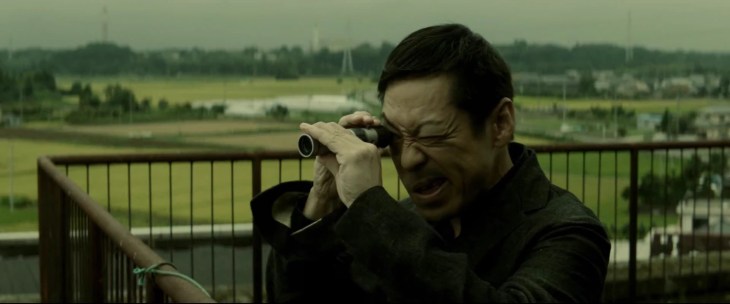Kiyoshi Kurosawa’s latest release Creepy received its U.K. premiere tonight as part of the London Film Festival. It blends elements of police drama, suspense and mild horror to create an intriguing film that achieves much but ultimately falls down due to a lack of ruthlessness in editing that would have helped the pacing.
Set in approximately 2009, it tells the story of a retired policeman Takakura (Hidetoshi Nishijima) who has changed careers to work as a criminology professor at a local university. Having moved to a new part of town with his wife Yasuko (Yūko Takeuchi) and dog Max, they begin to become suspicious of the titular creepy neighbour Nishino (Teruyuki Kagawa) and his daughter Mio (Ryoko Fujino), whilst Takakura attempts to solve an old case that has come out of the woodwork.
The casting of the genuinely creepy Kagawa is a solid choice. Director Kurosawa is on familiar ground, having worked with him on 2009’s Tokyo Sonata, though this role is very much a departure from the jobless family man we saw previously. When the results are this good there’s no need to change.
Kurosawa, working again with cinematographer Akiko Ashizawa, achieves a lot with natural lighting to create darkness for the lead characters as they delve into their inner-most thoughts. This was an effective technique used previously by the pair in Journey To The Shore and is mined more subtly here to arguably better effect, especially in one particular witness interrogation scene.
However, there are flaws. The ending could genuinely have happened about twenty minutes prior to when it finally occurs, and when the story is finally resolved the relief I felt wasn’t for any of the particular characters but more for the fact it signalled the end was in sight. It’s unfortunate that the ending is so shocking and powerful with some great acting that was undermined by the preceding needless plot extension.
There were a few ideas throughout the film that seemed to fizzle out. Saki (Haruna Kawaguchi) was really prominent for a good portion of the film but was clumsily written out before the resolution of her storyline; her family went missing but she doesn’t seem to care why in the end. A police chief is written into the key part of the story to get Takakura out of a dead end in the plot. There’s a mind control element to the story that isn’t ever fully explained, instead expecting the viewer to just go with it.
After a long setup, this film is genuinely exhilarating for about an hour. With a shorter ending and a little more clarity, it could have been much better than the final result. For me, it is a missed opportunity.


[…] United Kingdom La La Land Frantz Dancer Creepy Psychonauts: The Forgotten Children Queen of […]